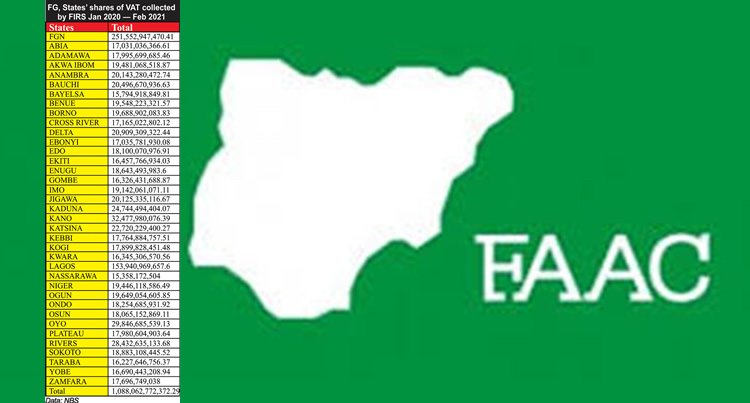
The Federation Account and Allocation Committee meeting initially scheduled for last week will now hold on Tuesday and Wednesday.
The Chairman of the Commissioner, David Olofu, and the Delta State Commissioner for Finance, State Commissioner for Finance Mr Fidelis Tilije, disclosed this in separate interviews with The PUNCH on Monday.
But Olofu, who is also the Benue State Commissioner for Finance, added that the delay in holding the FAAC meeting had affected the activities of many states including payment of salaries and capital expenditures.
FAAC, which is headed by the Minister of Finance, Budget and National Planning, and whose members include state Commissioners of Finance, states’ Accountants – General, Accountant – General of the Federation and the Permanent Secretary of the Federal Ministry of Finance meet every month to share revenues among the federal, state and local governments.
The FAAC meeting was scheduled to hold on Wednesday and Thursday last week, but the Federal Ministry of Finance, in a statement on Wednesday by its director of Home Finance, Stephen Okon, said it had been postponed indefinitely.
The postponement of the meeting, which the ministry said was due to certain circumstances came a few days after the Economic and Financial Crimes Commission (EFCC) arrested, Accountant General of the Federation, Ahmed Idris, over an alleged N80 billion fraud.
On Wednesday, the Minister of Finance, Budget and National Planning, Zainab Ahmed, announced an indefinite suspension of Idris without pay.
When contacted on Monday, Olofu, who declined to comment on Idris arrest, said that the delay in the sharing of this month’s allocations had affected most of the states of federation of meeting their obligations.
He stated, “We are holding FAAC meeting on Tuesday and Wednesday, adding, ‘the delay has affected government activities.
“We have cash group plans at states, those cash group plans have not been met, so that has put in the cooler all plans of cash group and they have yet to be met including payment of salaries and capital expenditure because over 28 states in the country rely on federal allocation except Lagos and Rivers. In fact, no other states again, all other states depend on allocation,” Olofu said.
On his part, the Ekiti State Commissioner for Finance, Akin Oyebode, said the delay in the FAAC meeting brought to the fore the need to ensure fiscal federalism.
The commissioner, who said that Nigeria was producing less crude than OPEC quota and spending heavily on pipeline security and infrastructure, said, “Despite the huge spending on security, we are still unable to secure our pipelines, we can see heavy theft of crude oil, that should concern anyone.
“Despite significant investment in agriculture, agriculture is still growing at 3 per cent per annum. We should be asking questions about how do we invest in storage and irrigation which are the big drivers of productivity in agriculture, which is the mainstay of our economy. These are conversations we should be having.
“We should be having conversations about how do we decentralise our grid infrastructures, how do we put in the grids that we need to deepen and increase electricity generation. We need conversation around even fiscal federation – is the current revenue sharing formula the right one?
“Oil production has dropped to about 1.4 million barrels per day and we are spending hugely on subsidy. Not only are we earning less from crude, we are actually spending more to import refined products. At the end of the day, we are going to end up with the position that subsidy is simply not sustainable and something has to be done.
“, I think, in the spirit of fiscal federalism, the states should be given the choice whether or not they want the subsidy for the refined products being sold in their state.
The Delta State Government has said even though Federation Account Allocation A Committee (FAAC) does not hold its meeting, it will no affect Delta state finance.
The State Commissioner for Finance Mr. Fidelis Tilije, stated this on Monday in an interview with The PUNCH in Asaba, said that there will be FAAC meeting on Wednesday.
Economists urge states to be self-reliant in revenue generation
Commenting on the delayed FAAC meeting, A political economist and former presidential candidate, Prof Pat Utomi, urged States to create an environment for wealth creation rather than depend solely on the federal allocation.
He said, “States must focus more on creating the environment for wealth creation. If you go back to the late 50s and early 60s, most of the developments that took place in Nigeria are from the subnational governments. They collected the revenues, and send 50 per cent of it to the centre but the military ruined all of that.
“So, Nigeria became more focused on sharing revenues than on the fundamental way of governing, which is the production and taxing earned revenue. Whenever there is no revenue to share, the States are in complete trouble and they become bureaucracies that are unable to manage themselves because they are dependent.
“This is not the way they should function. I have in fact argued that local governments should be restructured as economic development areas rather than political drain pipes where a local government in Ogun will be struggling with the one in Oyo to offer better incentives for businesses to relocate so that they can benefit from the tax.”
A Professor of Economics at the Olabisi Onabanjo University, Ago-Iwoye, Ogun State, Prof Sheriffdeen Tella, said that one of the reasons for the delay is likely the recent arrest and suspension of the Accountant-General.
He added that States should stop depending on the federal government and find a way to boost revenue.
Tella said, “I think the delay is caused by the action of the Accountant-General who stole money. He happens to be a major stakeholder in the meeting they are supposed to hold to decide on the allocation. It also exposes the States’ dependence on the Federal Government. That is not good enough because there is no State that cannot take care of itself if they are really working if the governors are thinking out of the box.”
He further said that this delay may lead to States being unable to pay salaries, adding that the States may also owe creditors and contractors, which may affect productivity levels.
“The major delay will be on salary payment. It would also be on paying their creditors and contractors. When this happens, it will likely affect productivity and reduce output,” Tella said.
NEC meeting fails to hold two consecutive months
He stated this as the National Economic Council chaired by the Vice President, Professor Yemi Osinbajo, SAN, failed to meet two consecutive months as most members, including contesting 2023 elections intensified their electioneering.
Impeccable sources close to council members who spoke to one of our correspondents anonymously affirmed that there has not been any sitting in April and May. More so, there were no prior announcements of suspension of NEC meetings.
According to the source, “Yes, there have been no meetings for two months now. Also, there was no official communication to members that the meeting won’t be held in the coming months.
“I believe everyone understands that this is an election season and they all moved on with their political activities.”
Copyright PUNCH.
All rights reserved. This material, and other digital content on this website, may not be reproduced, published, broadcast, rewritten or redistributed in whole or in part without prior express written permission from PUNCH.
Contact: [email protected]





